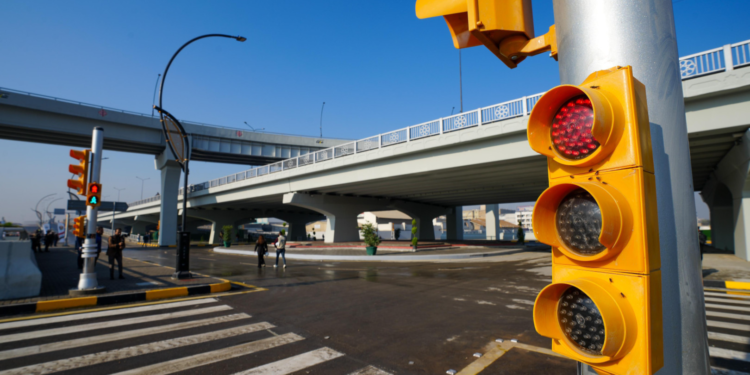Shafaq News/ Iraq is moving forward with two major transportation initiatives—the long-awaited Baghdad Metro and the Najaf-Karbala fast train—as potential solutions to the country’s worsening traffic congestion and economic challenges.
Reviving the Baghdad Metro Project
In February 2024, Prime Minister Mohammed Shia al-Sudani officially launched the Baghdad Metro and Najaf-Karbala train projects, marking a new phase in Iraq’s infrastructure development. A Lebanese-Malaysian consortium (CHSS and HSS) was appointed as consultants, reviving hopes for a modernized transit system.
The project envisions a fully automated, electric metro system with seven lines and 14 major stations, connecting key districts such as Alawi, Al-Shaab, Al-Tayaran Square, Al-Kadhimiya, Baghdad Airport, and Al-Qadisiya. Trains are expected to run at speeds of 80–140 km/h, serving up to three million passengers daily and covering 85% of the capital.
The metro’s design includes underground tunnels (reaching depths of 20 meters to avoid road conflicts), commercial spaces, elevators, escalators, parking for 10,000 vehicles per station, and dedicated maintenance depots. However, despite government assurances, MP Aqil al-Fatlawi of the parliamentary transport committee noted a lack of visible progress.
The project, estimated at $18 billion, involves major international firms, including France’s SYSTRA and SNCF, Spain’s Alstom and Talgo, Turkish contractors, and Germany’s Deutsche Bank. Nasser al-Asadi, an advisor to the PM, claimed construction could finish in four years.
Najaf-Karbala Fast Train: A Game-Changer for Pilgrims
The 90-kilometer Najaf-Karbala fast train, another key project, aims to cut travel time between the two holy cities from over three hours by car to just 30–40 minutes. Designed for speeds up to 240 km/h, the line will feature four stations with modern amenities, including air-conditioned carriages, women-and-children sections, and facilities for the elderly and disabled.
Though details on funding remain scarce, the project is part of a $2.5 billion rail infrastructure plan. Al-Fatlawi criticized the lack of progress, noting that the same consortium handling the metro was awarded this contract—yet construction has yet to begin.
Expected Benefits
- Traffic Relief: Baghdad’s roads, built for 400,000 vehicles, now struggle with over four million, causing chronic gridlock. The metro could ease this by transporting three million passengers daily.
- Economic Growth: Thousands of jobs in construction and operations, increased property values, and new commercial hubs around stations.
- Environmental Gains: Electrified metro systems could cut emissions by 75% per passenger compared to cars, reducing Baghdad’s severe air pollution.
- Pilgrimage Efficiency: The Najaf-Karbala train will provide a safer, faster alternative for millions of annual pilgrims, boosting religious tourism.
Despite the grand vision, skepticism persists over execution. Parliament has repeatedly summoned officials for updates, but tangible results remain elusive. For now, Iraqis await signs that these projects will move beyond plans and into reality.
Source: Shafaq News
























































